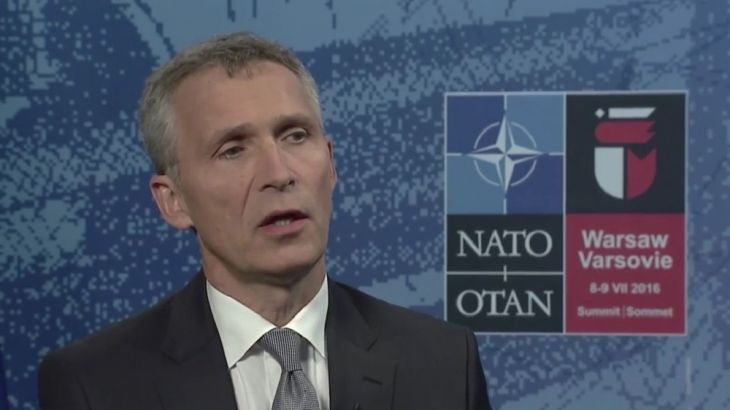NATO chief: No plans for combat troops in Libya
Jens Stoltenberg tells Al Jazeera that military alliance will help to build Libya’s capacities to defend itself.

NATO is not planning combat operations inside Libya, which is facing an increased security threat from the Islamic State of Iraq and the Levant (ISIL) group, Secretary General Jens Stoltenberg has said.
“We are looking into what we can do to support Libya, for instance by building defence institutions and helping them build their capacities to defend themselves,” Stoltenberg told Al Jazeera.
Keep reading
list of 4 itemsNATO allies must do more as Ukraine runs out of ammunition: Stoltenberg
Nordic tensions on the rise amid Russian anger over NATO accessions
Flag of NATO’s 32nd member, Sweden, raised at alliance’s headquarters
He said that the transatlantic military alliance “stands ready to help assist the new Libyan Government of National Accord”, but “will not do anything without request from that government”.
A UN-backed Government of National Accord arrived in Tripoli on March 31 as part of an international effort to bring stability in the north African country, which descended into political chaos and conflict after an armed uprising toppled Muammar Gaddafi five years ago.
READ MORE: When is the next Libya intervention?
The new government, formed under a UN-mediated peace deal late last year, is supposed to replace the two rival administrations – one based in Tripoli, the other in the eastern city of Tobruk – that have been battling each other for more than a year.
Western powers hope the new government will request and channel foreign support to confront ISIL, also known as ISIS group, deal with refugee flows from Libya towards Europe, and restore oil production to shore up its economy.
The NATO chief spoke on a range of issues such as the Syria conflict, anti-ISIL operations in Iraq and the Russian assertion in Eastern Europe.
Lauding NATO’s role in handling the refugee crisis, Stoltenberg said that the military group was looking into whether it can expand some of these activities to the central part of the Mediterranean.
“That will be a different challenge, but NATO has assets,” he said, adding that NATO is transforming its activities towards “broader maritime operations that can do many things such as surveillance, monitoring and counter-terrorism”.